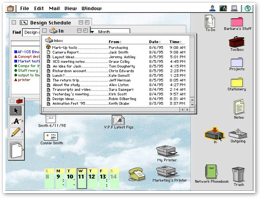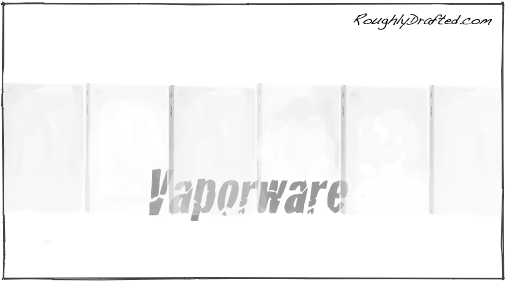
Vaporware: Why Apple Doesn't Blog
When John Gruber of the Daring Fireball included a note about a new product in his linked list of Mac Nerdery, he probably didn't foresee a controversy growing out of his passing reference to the product as "vaporware."
The Omni Group took offense at the comment in its own blog, saying that while its progress with OmniFocus isn't yet ready to ship, "it’s not vaporware. It’s just not completed. There’s a difference, and it has to do with being sincere about what we want to offer, and not touting magical features that we have no idea how to build."
Gruber defended his comment in a followup article, which cited no fewer than five dictionaries to prove that OmniFocus did indeed fit the definition of vaporware, even if the Omni Group insisted that it wasn't.
It would be easy to dismiss the comments on both sides as belabored semantics if vaporware itself wasn't a key aspect of Apple's legendary secrecy as well as a major force that binds the tech industry to legacy technology and distorts the competitive landscape. It also presents a great example of why sometimes, everything we officially know is wrong.
Why Apple Doesn't Blog
The first thing this minor controversy highlights is how potentially dangerous it can be for developers to announce anything in advance. Company blogs are the Pandora’s Box of such pre-announcements, even when not intended as such. Once something is stated in an official blog, the proverbial cat is difficult to stuff back into the bag.
As customers, we all want to know what's going to happen in the future, but we will also turn around and beat developers with the very information they share with us. One of the terms we hit them with is, of course, vaporware.
The other thing about blogs is that written text fails to capture the full range of rich human communication. It's easy to take more offense than is necessary to the wrong choice of words. Minor and casual criticism can quickly ferment into a difficult stink, and attempts to bury it can often just make it worse.
Blog entries are like emails that cc: to the entire world.
If anyone is still wondering why Apple does not encourage its internal developers to maintain blogs, here's a good example of how the good intentions behind sharing information can result in unpleasant, unintended consequences.
Apple is already assailed for not delivering products it has never even hinted at; if the company automatically assumes responsibility for rumors, imagine its predicament if it were to cast ideas for future products into the permanent record of a blog.

As noted in Why is Apple so Secretive?, the company uses secrecy to generate interest and garner publicity right when it will best help sales. In contrast, Microsoft has long used published plans of future products to generate publicity.
By focusing on the future rather than the present, Microsoft can continually position its competitors' products against ones it may choose to sell in the future.
Few products in the tech world can hope to compete against what may be offered in just a few years. This devastating business strategy works so well that we have given it a name: vaporware.
Vaporware as a Business Plan
Vaporware is nothing new to Microsoft. In 1991, the company announced Cairo as the next generation in operating systems, with an new user environment, an object file system, and distributed computing features.
Ten years later, the various parts of Cairo had been dropped or dramatically scaled back, and some were still in progress, including the object file system.
Shortly before the release of Windows XP in 2001, Microsoft began describing Longhorn as its new future next generation operating system. In 2003, Longhorn was described as still in progress, with four pillars of focus, one of which was the object or database file system promised back in 1991. Today, in 2006, the idea of a database file system has been finally abandoned as unworkable.
Microsoft has just released Vista to companies covered by software assurance, in order to prevent lawsuits from irate business customers who were assured that Vista licensing would be included in their prepaid software contracts. Vista is supposed to be shipped to other customers in January of 2007.
Microsoft benefits from pre-announcing its plans, and takes considerable criticism when it fails to meet them. At the same time, if Microsoft had shipped an unworkable database filesystem as part of "Windows XP+ 2003 Special Edition," while it would not meet the dictionary definition of "vaporware," it would also not have been a good thing for its customers, most of whom were happy with Windows 2000 anyway.
Sometimes what happens in Vaporware needs to stay in Vaporware.
So jumping back into the original case, who was wrong: the Omni Group for pre-announcing its product plans, John Gruber for blogging his opinion, or the Dictionaries, for assigning the word vaporware a definition that does not fit the actual use of the word?
Meet the Omni Group
Omni was one of the first Mac OS X developers to hit the ground running because of its prior experience as a NeXT developer. It was founded by Wil Shipley, who after a decade at Omni started his own company, Delicious Monster. Today both companies are putting out innovative applications that have won awards and rave reviews.
Omni's claims to fame are its OmniWeb browser, the Visio-compatible OmniGraffle drawing program and OmniOutliner idea organizer, both of which Apple bundles on new Macs, and the recently released OmniPlan, a project management tool that does the resource tracking and Gantt charting commonly associated with Microsoft Project.
The product in question is OmniFocus, a planned GTD manager. Unlike Apple, Omni can't hold dramatic press conference events and demand the front cover of leading magazines and newspapers just by sending out a coy invitation card. As with most small software developers, Omni has to rely on word of mouth to gain attention for its products.
Creating excitement about a yet non-existent product to gauge public interest definitely smells like vaporware, but it's hard to berate the company as if it were an abusive monopolist. There are existing products that could conceivably be threatened by undue attention directed to an OmniFocus that doesn't yet exist; the most obvious example is freeware that is used along with Omni's own Outliner program.
HawkWings presented ten other ways to accomplish the same thing, using applications users already have, plugins, and new standalone options. It seems hard to believe that anyone interested in this particular product category will withhold purchasing a $20 shareware app that could save them considerable time, simply to wait and see what Omni might deliver next year.
The Daring Fireball
John Gruber likes to call it as it is. His website, the Daring Fireball, features a "Jackass of the Week" column which regularly fingers sloppy tech journalists who print sensationalist and misleading ideas. In his linked list, Gruber points to news from around the web on a variety of topics, and offers a synopsis that is often brutally accurate. In describing why he called OmniFocus vaporware, he appealed to the highest authority in semantics:
The Dictionaries
I've never been an absolute fan of dictionaries. My dad would often use dictionaries to try to prove points that I refused to believe. Unlike math, which I could never prove wrong, I did find ways to take issue with definitions in dictionaries. As I grew up and discovered that dictionaries weren't really magic books, but just written by regular people, I gained new independence from the conformity of thought they tried to impose.
In technical circles, where new words are often coined for highly specific purposes, dictionaries don't always get it right. Vaporware is a great example. Of the definitions of vaporware cited by Gruber, the least offensive is from the New Oxford American Dictionary, which is the version Apple ships in Mac OS X:
"software or hardware that has been advertised but is not yet available to buy, either because it is only a concept or because it is still being written or designed."
That denotation is perhaps useful for technically challenged journalists assigned to write about the industry, but it fails to capture the word's connotation in actual use.
We don't need a special new word for "pre-released." Every technology product is not automatically vaporware from its first announcement until it ships. Further, there are products that did technically ship but were quite obviously vaporware.
Vapor for True
The best example that springs to mind is Apple's Copland. After years of development, Apple put together an alpha developer release that some developers did receive.
However, the public never benefited from the features Apple promised, which were repeatedly presented in Mac magazines for years. Scant bits of its remains were even salvageable in the years after it was officially canceled.
In retrospect, one could give Apple credit for applying parts of the "Copland look" to Mac OS 8, along with some of the features it promised, but overall, the core ideas of Copland were revealed to be as immaterial and fleeting as fog. 

The planned follow up to Copland, Gershwin, was even worse: it was eventually revealed that nobody at Apple had ever really worked on Gershwin. Poof!
What about Apple's Pink and Taligent? Both similarly offered up vaporous plans for how Apple would soon deliver what NeXT already had, but as years passed, the distance between 1989 and 1995 became increasingly embarrassing. Further, new threats from Microsoft obviated Taligent’s original intent of outdoing NeXT
Still, Taligent shipped CommonPoint, albeit in a different form than was originally planned and advertised. It also shipped on the wrong platform for Apple's customers, who were expecting to benefit from it.
From the dictionary definition, Taligent wasn't vaporware because it was technically available to buy, even if nobody actually bought it. Clearly, the dictionaries' definitions for vaporware are not very helpful. So far we have:
-
•Pink: vaporware ideas to distract from NeXT; never shipped.
-
•Taligent: vaporous, but did ship a product, just not what was intended.
-
•Copland: unfinished, aborted features; shipped and revoked a developer preview that was later salvaged.
-
•Gershwin: absolute vaporware.
And what about Microsoft? Its 1991 Cairo was most definitely vaporware, despite the fact that its Wikipedia article bends over backward to give Microsoft credit for eventually delivering most of the promises in some fashion, over the next decade. The Wikipedian apologists fail to grasp the point:
That's exactly what vaporware is! Vaporous clouds of product ideas that are formless and lack clear definition, which blow into new shapes as years of development work roll by, never really materialize as expected, and often dissipate entirely before the promised delivery date.
Now look at Microsoft's more recent plans for Windows:
-
•Blackcomb: Microsoft's Gershwin. Vaporware.
-
•Longhorn: half a decade of shifting vapors and changing features.
-
•Vista: not yet available for public sale, but it's not really vaporware; it exists.
Tiger and Vista Vapor?
Vista isn't available for purchase yet, and isn't quite finished; the official line is that Microsoft is waiting for developers to get their drivers ready. Still, at this point, one would have to be fairly ridiculous to call Vista vaporware.
We know exactly what it will offer, it's features and plans and timeline can't slip dramatically, and plenty of people have been using and reviewing prerelease versions over the last several months.
What about Mac OS X Leopard 10.5? The public can't buy it, but neither do we have much in the way of vaporous plans. Everything we know about Leopard comes from developer demonstrations and a few sneak peek pages on Apple's website. It does not promise anything magically impossible, and is really just another solid set of improvements over today's Mac OS X Tiger 10.4.
If either Microsoft or Apple were struggling to stay in the race, and had offered up plans for a next generation system that promised to deliver things that appeared out of reach or even a significant challenge, then the term vaporware might be useful in describing those efforts. But neither are. Everything we know about Vista and Leopard is very concrete.
Why the World Went Windows presented this definition of vaporware:
"FUD is often paired with Vaporware, the placeholder promise of a future product which is described with impressive sounding features that never seem to materialize. Vaporware is sometimes equated with unreleased products; however, the real point of Vaporware is not positive remarks about a future product in general.
Vaporware is a false positive, designed to create an illusion of competition when none will ever actually exist, with the sole purpose of delaying existing sales until a competing product can be created, or until the competitive threat is killed. Vaporware is fraud."
From that definition, neither Tiger nor Vista is vaporware, and neither is the vast majority of software and hardware products that may be known about for a short period in advance of actually going on sale.
Sometimes, the dictionary is wrong.
This Series










Thursday, December 7, 2006

 Bookmark on Del.icio.us
Bookmark on Del.icio.us Discuss on Reddit
Discuss on Reddit Critically review on NewsTrust
Critically review on NewsTrust Forward to Friends
Forward to Friends
 Get RSS Feed
Get RSS Feed Download RSS Widget
Download RSS Widget





